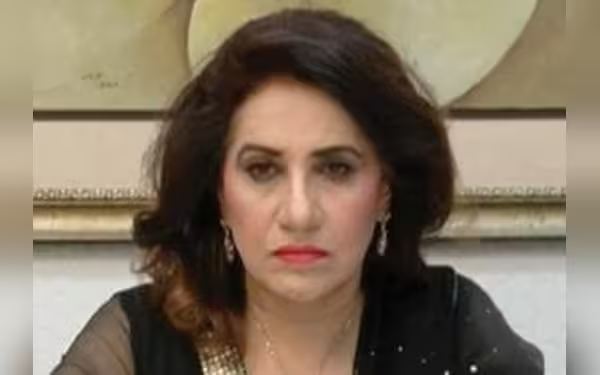Saturday, November 16, 2024 05:47 PM
Uzma Kardar Critiques PTI Lahore Rally as Dismal Failure
- Uzma Kardar labels PTI rally a dismal failure.
- Criticism highlights PTI's declining popularity.
- Kardar praises Maryam Nawaz's leadership in Lahore.
 Image Credits: nation_pk
Image Credits: nation_pkUzma Kardar criticizes PTI's Lahore rally as a dismal failure, highlighting declining popularity and praising PML-N's leadership.
In recent times, political rallies have become a significant aspect of Pakistan's political landscape, serving as a platform for parties to showcase their strength and connect with the public. However, the recent rally held by Pakistan Tehreek-e-Insaf (PTI) in Lahore has drawn sharp criticism from various quarters, particularly from members of the opposition. One such critic is Uzma Kardar, a member of the Provincial Assembly of Punjab and a prominent leader of the Pakistan Muslim League-Nawaz (PML-N). Kardar has labeled the rally a “dismal failure,” suggesting that it reflects PTI's declining popularity among the masses.
Speaking on a private news channel, Uzma Kardar expressed her disappointment with the turnout at the PTI rally, pointing out that the empty chairs and lackluster attendance were clear indicators of the party's waning influence. She stated, “The people of Lahore deserve better than empty promises and divisive rhetoric.” This statement underscores the growing sentiment among the public that PTI has failed to deliver on its commitments, particularly regarding the development of Lahore.
Kardar further criticized PTI for what she termed “failing politics,” emphasizing that the party has not presented a clear agenda or concrete plans for the city's development. This lack of direction, according to her, has significantly eroded public trust in PTI. She believes that the youth, who are often seen as the backbone of political movements, are being misused by PTI leadership, leading to an atmosphere of anarchy and chaos rather than constructive political engagement.
In contrast, Uzma Kardar praised Chief Minister Punjab Maryam Nawaz for her unwavering dedication to the welfare and development of Lahore. She highlighted that Maryam Nawaz has demonstrated remarkable leadership qualities, working tirelessly to improve the lives of the citizens of Punjab. This positive comparison serves to reinforce the narrative that while PTI struggles to connect with the public, PML-N is actively working towards tangible improvements in governance.
Additionally, Kardar did not shy away from criticizing Ali Amin Gandapur, another PTI leader, for the low turnout at the Lahore gathering. She pointed out that the poor attendance was a clear indication of the public’s growing disillusionment with Gandapur’s politics. This sentiment reflects a broader trend where political parties must now contend with an increasingly aware and discerning electorate.
The recent Lahore rally of PTI has not only been termed a “dismal failure” by Uzma Kardar but also serves as a wake-up call for political parties in Pakistan. As the political landscape continues to evolve, it is crucial for parties to engage meaningfully with the public, present clear agendas, and foster trust. The citizens of Lahore, and indeed all of Pakistan, deserve leaders who prioritize their needs over political theatrics. The future of political engagement in the country may very well depend on how well parties can adapt to the changing expectations of the electorate.













